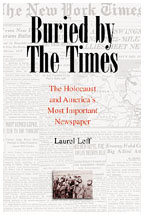October 19, 2005: Reading Room
Laurel Leff ’78 argues that the Times shied away from Jewish issues because its publisher was Jewish. (courtesy Laurel Leff ’78) |
Buried
by the Times
Laurel Leff ’78 examines The New York Times’ coverage
of the Holocaust
By Alex Kraus
When Laurel Leff ’78 was a young girl at Sinai Temple religious school in Los Angeles, she learned that Americans didn’t rush to rescue Jews from the Holocaust simply because Americans did not know about the atrocities as they were happening.
But later, as a reporter for The Wall Street Journal and an editor for the Hartford Courant, Leff learned that stories of the Holocaust had been buried deep in the pages of the nation’s newspapers. While that discovery was already documented in historian Deborah Lipstadt’s book Beyond Belief, a broad media survey, Leff decided to dig deeper into why news organizations downplayed the Holocaust by investigating its treatment by the most influential newspaper of the day, The New York Times.
She found that of the 24,000 front-page articles published by the Times during World War II, only 26 dealt with the Holocaust. In her first book, Buried by The Times: The Holocaust and America’s Most Important Newspaper, Leff takes a look at why the deaths of 6 million Jews rarely made it to that paper’s front page.
 Leff,
whose two great-aunts and two great-uncles were taken from Slovakia to
their deaths in Poland, concluded that the Times shied away from
Jewish issues because its publisher, Arthur Hays Sulzberger, was Jewish.
An anti-Zionist, Sulzberger fervently believed that Judaism was a religious
affiliation only, not an ethnic heritage, writes Leff. He underplayed
the genocide, argues Leff, because he did not want to be perceived as
a Jew who went out of his way to help other Jews.
Leff,
whose two great-aunts and two great-uncles were taken from Slovakia to
their deaths in Poland, concluded that the Times shied away from
Jewish issues because its publisher, Arthur Hays Sulzberger, was Jewish.
An anti-Zionist, Sulzberger fervently believed that Judaism was a religious
affiliation only, not an ethnic heritage, writes Leff. He underplayed
the genocide, argues Leff, because he did not want to be perceived as
a Jew who went out of his way to help other Jews.
As a veteran reporter, Leff, who teaches news and nonfiction writing at Northeastern University in Boston, understands how the personalities in a newsroom affect what ends up in the newspaper. She argues how the biases of Sulzberger and many Times foreign correspondents kept the Holocaust off the front page, and out of the minds of American readers.
While the Times has acknowledged its shortcomings on the Holocaust in a 1996 New York Public Library exhibit, the paper dismissed Buried by The Times in a review as a “high-minded crusade.” The Washington Post called Leff “consumed by prosecutorial zeal.” Other reviews, in the Columbia Journalism Review and Commentary, have praised the book, which was published by the Cambridge University Press in March.
Leff reviews the facts and circumstances of the Holocaust articles, one by one. Her style is scrupulous, which she attributes to her studying under journalism professor John McPhee ’53 while at Princeton, where she graduated from the Woodrow Wilson School. She says, “There were many voices echoing in my head as I wrote Buried by The Times and McPhee’s was one of them, prodding me to create as much of a narrative as possible, and insisting on clear writing and clear thinking.”
Leff can’t say whether history would have changed for the better
if the Holocaust had been regular front-page news. But that, she says,
shouldn’t matter: Editors have a responsibility to tell readers
what’s important. ![]()
Alex Kraus, a student at Washington & Lee University, is a freelance writer.
BOOK SHORTS
 American
Courage: Remarkable True Stories Exhibiting the Bravery That Has Made
Our Country Great — edited by HERBERT W. WARDEN III ’46
(William Morrow). The author has collected personal accounts of Americans
over four centuries, from William Bradford’s tale of the Mayflower
landing to a New York Times reporter’s account of Sept.
11, 2001. Warden is a writer who served as a Marine during World War II
and the Korean War.
American
Courage: Remarkable True Stories Exhibiting the Bravery That Has Made
Our Country Great — edited by HERBERT W. WARDEN III ’46
(William Morrow). The author has collected personal accounts of Americans
over four centuries, from William Bradford’s tale of the Mayflower
landing to a New York Times reporter’s account of Sept.
11, 2001. Warden is a writer who served as a Marine during World War II
and the Korean War.
 The Source
of Success: Five Enduring Principles at the Heart of Real Leadership
— PETER GEORGESCU ’61 with David Dorsey (Jossey-Bass). Drawing
upon his life experiences, from his boyhood in Communist Europe to his
time as chief executive officer of an advertising agency, Georgescu explores
how an effective leader must cultivate relationships with both customers
and employees. Georgescu is chairman emeritus of Young & Rubicam.
The Source
of Success: Five Enduring Principles at the Heart of Real Leadership
— PETER GEORGESCU ’61 with David Dorsey (Jossey-Bass). Drawing
upon his life experiences, from his boyhood in Communist Europe to his
time as chief executive officer of an advertising agency, Georgescu explores
how an effective leader must cultivate relationships with both customers
and employees. Georgescu is chairman emeritus of Young & Rubicam.
 The Purchase
of Intimacy — VIVIANA A. ZELIZER (Princeton University
Press). Zelizer challenges the view that intimacy and the economy should,
and can, be kept separate. She shows that most close personal relationships
involve economic activity, such as consumption (buying houses) and the
transfer of assets (inheritance). Acknowledging the connection between
intimacy and economic activity, she argues, promotes more effective relationships.
Zelizer is a sociology professor at Princeton.
The Purchase
of Intimacy — VIVIANA A. ZELIZER (Princeton University
Press). Zelizer challenges the view that intimacy and the economy should,
and can, be kept separate. She shows that most close personal relationships
involve economic activity, such as consumption (buying houses) and the
transfer of assets (inheritance). Acknowledging the connection between
intimacy and economic activity, she argues, promotes more effective relationships.
Zelizer is a sociology professor at Princeton. ![]()
By Bridget Durkin ’07
For a complete list of books received, click here.

